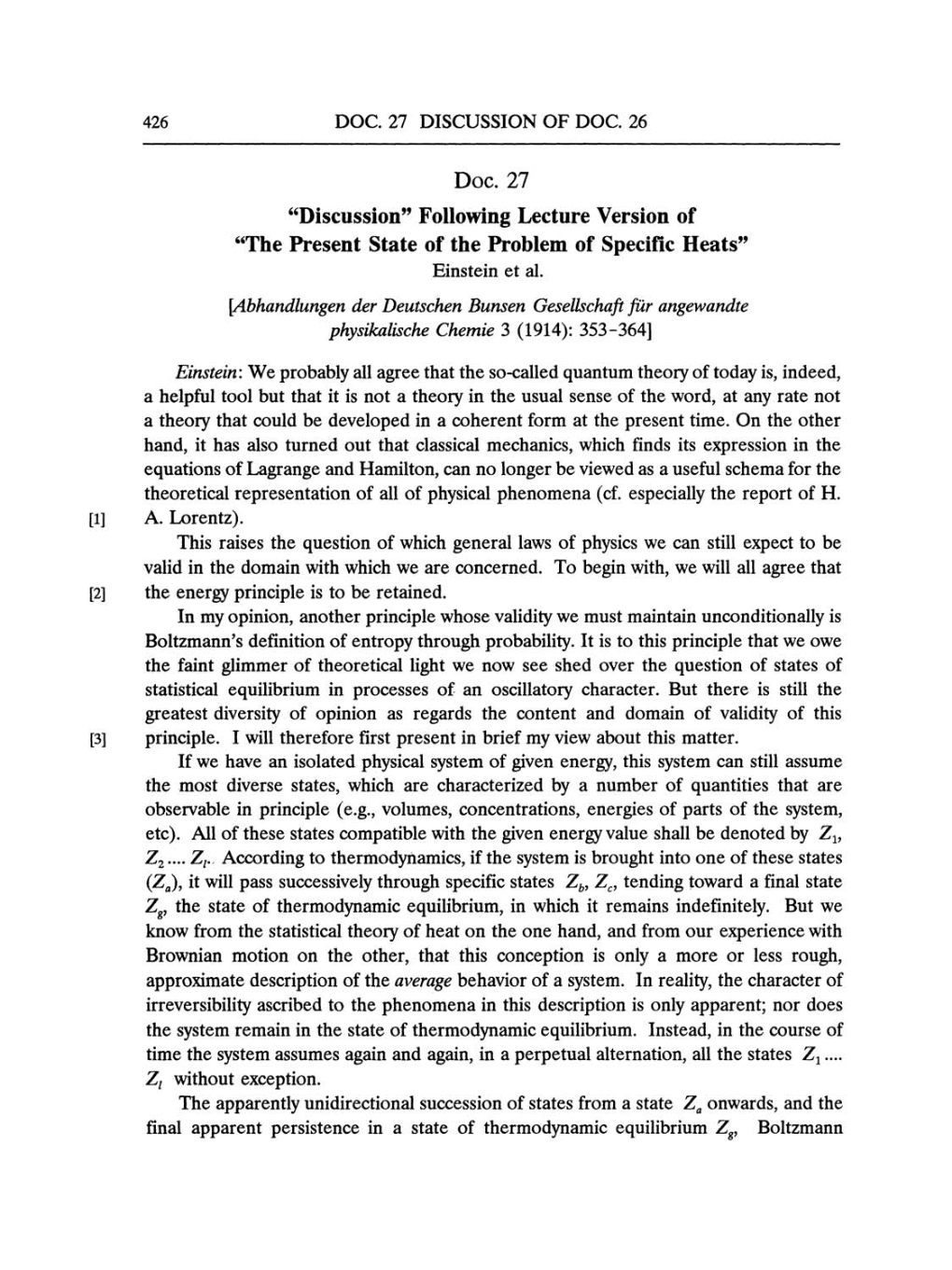426
DOC.
27
DISCUSSION OF
DOC. 26
Doc. 27
"Discussion"
Following
Lecture
Version
of
"The Present State
of
the Problem
of
Specific
Heats"
Einstein
et al.
[Abhandlungen
der
Deutschen Bunsen
Gesellschaft
für
angewandte
physikalische
Chemie 3
(1914):
353-364]
Einstein: We
probably
all
agree
that the
so-called
quantum
theory
of
today
is,
indeed,
a
helpful
tool but that
it
is
not
a
theory
in
the usual
sense
of the
word,
at
any
rate not
a
theory
that
could
be
developed
in
a
coherent form at
the
present
time. On the other
hand, it has also
turned
out
that
classical
mechanics,
which finds its
expression
in
the
equations
of
Lagrange
and
Hamilton,
can no
longer
be viewed
as a
useful schema for
the
theoretical
representation
of
all
of
physical
phenomena
(cf.
especially
the
report
of
H.
[1]
A.
Lorentz).
This raises
the
question
of
which
general
laws
of
physics we can
still
expect
to
be
valid in
the domain
with which
we are
concerned. To
begin with, we
will all
agree
that
[2]
the
energy
principle
is
to
be retained.
In
my
opinion,
another
principle
whose
validity
we
must
maintain
unconditionally is
Boltzmann's definition of
entropy through
probability.
It
is to this
principle
that
we owe
the
faint
glimmer
of theoretical
light
we now see
shed
over
the
question
of
states
of
statistical
equilibrium
in
processes
of
an oscillatory
character. But there
is
still
the
greatest
diversity
of
opinion
as
regards
the
content and
domain of
validity
of
this
[3]
principle.
I will
therefore
first
present
in
brief
my
view
about
this matter.
If
we
have
an
isolated
physical system
of
given energy,
this
system can
still
assume
the
most diverse
states,
which
are
characterized
by
a
number of
quantities
that
are
observable
in
principle
(e.g., volumes,
concentrations,
energies
of
parts
of the
system,
etc).
All
of these
states
compatible
with
the
given energy
value shall be
denoted
by
Z1,
Z2 ....
Zl. According
to
thermodynamics,
if
the
system
is
brought
into
one
of these
states
(Za),
it will
pass successively
through
specific
states
Zb, Zc,
tending
toward
a
final state
Zg,
the
state
of
thermodynamic equilibrium,
in which it
remains
indefinitely.
But
we
know
from the
statistical
theory
of heat
on
the
one
hand,
and
from
our experience
with
Brownian
motion
on
the
other,
that
this
conception is
only a more or
less
rough,
approximate description
of the
average
behavior of
a system.
In
reality,
the character of
irreversibility
ascribed to
the
phenomena
in this
description is
only apparent; nor
does
the
system
remain
in
the
state
of
thermodynamic
equilibrium.
Instead,
in
the
course
of
time
the
system assumes again
and
again,
in
a
perpetual alternation,
all
the
states
Z1....
Zl
without
exception.
The
apparently
unidirectional
succession
of
states from
a
state
Za
onwards,
and
the
final
apparent persistence
in
a
state
of
thermodynamic equilibrium
Zg,
Boltzmann
